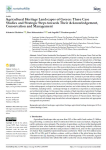Gkoltsiou A., Athanasiadou E., Paraskevopoulou A.T. (2021). Agricultural heritage landscapes of Greece: three case studies and strategic steps towards their acknowledgement, conservation and management. Sustainability, 01/06/2021, vol. 13, n. 11, p. 1-28.
https://doi.org/10.3390/su13115955
https://doi.org/10.3390/su13115955
| Titre : | Agricultural heritage landscapes of Greece: three case studies and strategic steps towards their acknowledgement, conservation and management (2021) |
| Auteurs : | A. Gkoltsiou ; E. Athanasiadou ; A.T. Paraskevopoulou |
| Type de document : | Article |
| Dans : | Sustainability (vol. 13, n. 11, June 2021) |
| Article en page(s) : | p. 1-28 |
| Langues : | Anglais |
| Langues du résumé : | Anglais |
| Catégories : |
Catégories principales 07 - ENVIRONNEMENT ; 7.4 - Ressources Naturelles : Paysage, Biodiversité, Patrimoine naturelThésaurus IAMM PAYSAGE AGRICOLE ; CONSERVATION DU PAYSAGE ; PATRIMOINE NATUREL ; PATRIMOINE CULTUREL ; DEVELOPPEMENT DURABLE ; ATTENUATION DES EFFETS DU CHANGEMENT CLIMATIQUE ; SERVICE ECOSYSTEMIQUE ; ZONE RURALE ; REGION MEDITERRANEENNE ; GRECE |
| Résumé : | United Nation Sustainable Development Goals (SDGs), the European Green Deal and the new Common Agricultural Policy (CAP) are legislative proposals counting on rural and agricultural landscapes to assist climate change mitigation, ecosystem services and preservation of heritage. Agricultural landscapes take up more than 10% of the earth’s land surface (1.5 billion ha), presenting a continuous field of interaction between man and nature, shaping the earth’s epidermis since antiquity. The Mediterranean basin is one of the most evident places on earth exhibiting this relationship, between the anthropogenic and the natural, hosting lands of enormous ecological, economic and cultural value. With Greece’s economy being based largely on agriculture in the past, traditional Greek agricultural landscapes present great socio-cultural importance; those landscapes, managed appropriately, could dynamically help combat climate issues, continue to provide services of high value and also present local character, tradition and culture. Yet, the acknowledgement of agricultural heritage, the creation of mixed productive socio-ecological profiles and the realization of governance schemes towards agricultural connections, such as linking traditional agricultural practices to the wider anthropogenic, ecological and recreational services, are in their infancy for many countries worldwide, including Greece. Landscape heritage is considered as important as archaeological and architectural heritage. In this paper, three examples of high importance Agricultural Heritage Landscapes (AHLs) are presented: the masticulture in Chios island; the black (Corinthian) raisin vineyards in Aigialeia (Egialia), Peloponnese; and the olive groves of Thassos island. Their importance is analyzed and strategic steps towards their acknowledgement, conservation and appropriate management are presented. |
| Cote : | En ligne |
| URL / DOI : | https://doi.org/10.3390/su13115955 |







